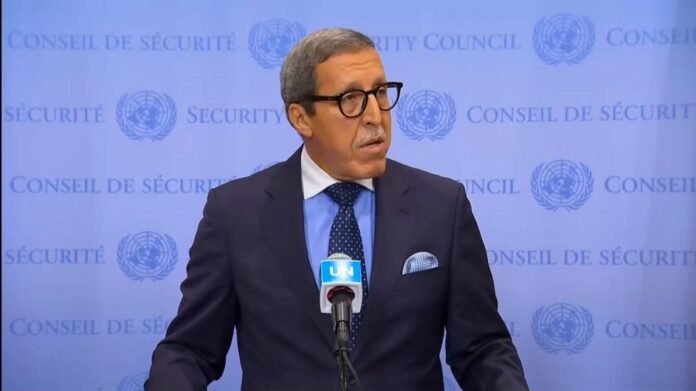In the latest UN Security Council session on the Moroccan Sahara, Morocco’s UN Ambassador, Omar Hilale, revealed details regarding the division proposal for the Sahara presented by UN envoy Staffan de Mistura. Hilale clarified that this proposal originated in Algeria, which revived the idea in an attempt to ease international pressure, despite Morocco’s firm rejection.
Historical Background of the Proposal: Reviving Old Ideas
According to Hilale, the division proposal dates back to an earlier period under the late Algerian President Abdelaziz Bouteflika when former UN envoy James Baker proposed it in 2001 as a solution to the Sahara conflict. Hilale asserts that Algeria revisits this proposal whenever it feels pressured internationally to adopt specific stances.
Algeria’s Dilemma in the International Context: Growing Pressure and Recognitions of Moroccan Sovereignty
The current international context is characterized by clear positions from major nations supporting Morocco’s autonomy proposal, including the United States, France, Germany, Spain, and several European countries. Within this context, Morocco sees Algeria attempting to deflect international pressure by reintroducing the division proposal, which Hilale considers a “stillborn” attempt to counter growing support for Moroccan sovereignty and the autonomy initiative.
Algeria’s Silence: Diplomatic Tactic or Lack of Alternatives?
The official Algerian stance remains ambiguous regarding the division proposal, avoiding a clear position after its presentation at the UN Security Council, while the Polisario Front openly rejected it. This Algerian silence raises questions about its commitment to international political solutions. Does it reflect a fear of losing credibility on the international stage or an attempt to avoid further pressure?
Question for the UN Envoy: Is the Division Proposal an Initiative or Algerian Pressure?
Moroccan Foreign Minister Nasser Bourita suggested that UN envoy Staffan de Mistura should clarify the origins of this proposal, indicating that certain parties pushed for a renewed consideration of division, potentially questioning the envoy’s impartiality. These statements highlight the responsibility of international envoys to maintain careful neutrality.
Ignoring Algerian Proposals: Morocco’s Strategy to Reinforce Territorial Integrity
On the other hand, Morocco firmly rejects the division of the Sahara, considering autonomy as the sole realistic solution to the conflict. This Moroccan stance reflects the strength and consistency of royal diplomacy in defending territorial integrity, along with growing international support. The question remains: will Morocco hold fast to this strategy, or will increasing pressure compel it to accept an undesired alternative?
Conclusion: Algeria Facing Growing Diplomatic Isolation
It appears Algeria is in a challenging position, facing rising international support for Morocco while its proposals lack resonance on the global stage. Will international pressure lead Algeria to revise its positions and open the door to a realistic political solution that promotes regional stability?


